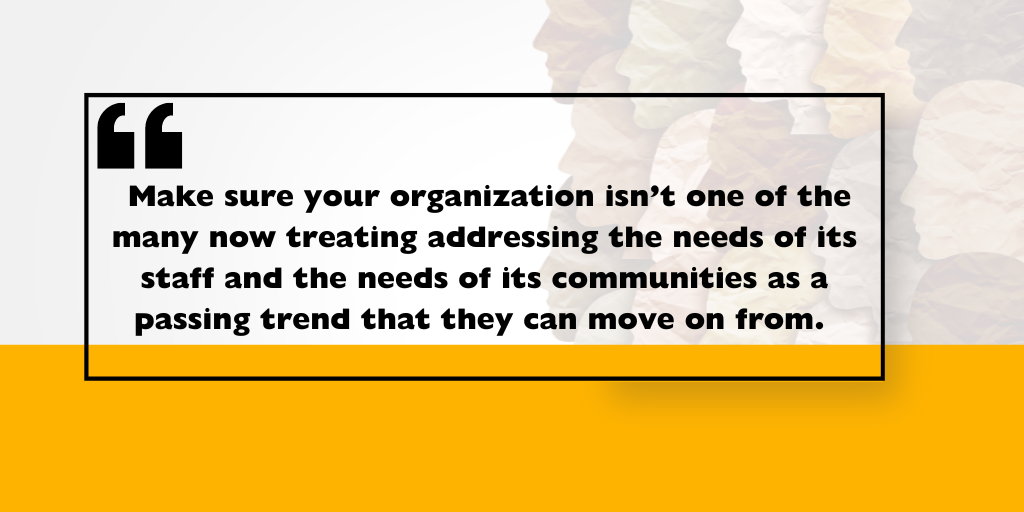The Backlash to Workplace DEI
While we hit a beautiful blip in time where it felt like there was widespread acknowledgement that DEI should be given focused attention in the workplace — with newly created DEI Officer positions proliferating and DEI plans abounding — it appears that we are already seeing the ebb, Despite a wealth of information showing that across the board our workplaces are plagued by racism.
To be clear, DEI as a term and as an industry might be relatively new, but the work of furthering equity is longstanding and has taken various forms and happened under various labels. From movements for abolition to civil rights to anti-racism and beyond, equity efforts, on an individual level or in organized form, have existed as long as inequities. What felt different about the racial awakening after George Floyd’s 2020 murder is that it brought the conversation of equity beyond the social services and social justice circles. Attention and awareness became widespread in our society at large and many mainstream businesses felt they needed to change and respond to remain relevant. Public statements from organizations espousing commitments to equity seemed to be everywhere. And DEI was commodified, including some ways that appeared useful. Racism wasn’t just something to talk about, but rather both the nonprofit and for-profit sector felt the pressure to address it. And they addressed it by investing in consultants and in-house professionals who could create systems to address inequities in a range of workplace practices including those tied to culture.
While investing in organizational culture was not new, centering bias in the discussion felt radically different. Moving culture conversations into the sphere of DEI was an acknowledgement of the elephant in the room of much previous org culture work. More than a ping pong table and casual Fridays, organizations seeking positive culture need to understand their power dynamics, create true inclusion, and enact policies that counteract bias in workplace rewards and punishments. Over the last few years, it has felt almost mainstream for organizations to set out to do just that. But for many who began those efforts, setting out on the path was as far as they were willing to go on the journey.

It appears we are already in a period of backlash. Anti racist work is hard and uncomfortable and as organizations with increasing costs and diminished revenue enact layoffs, eliminating newer positions and departments that are causing organizational unease shouldn’t come as a surprise. No surprise, but it’s terrible none the less. And there are plenty of articles that openly or subtly blame the industry itself — pointing to DEI efforts that were unsuccessful and methodologies that were flawed. As with any profession, industry, or program — some are better than others but the tragedy of this sudden eschewing of an industry so newly embraced is that organizations are diverse and inclusive only when they actively seek to be, and equity is either actively furthered or inequity — our societal norm — is upheld. Certainly not every DEI professional or program will increase DEI objectives, but certainly doing nothing to institute DEI will ensure organizations do not progress.
An organization can only be impactful in so far as it has a thriving staff. That thriving staff requires healthy culture, and a strong, positive culture can only emerge and be maintained when organizations create the policy and practices that allow for full inclusion and equity. These aren’t new truths but the time-tested realities of organizational success. The work might be difficult but it’s essential and shouldn’t be sacrificed.
We had momentum across industries and commitments to the values of diversity, equity, and inclusion. Make sure your organization isn’t one of the many now treating addressing the needs of its staff and the needs of its communities as a passing trend that they can move on from. We should all instead view it as our shared responsibility and steadfast commitment — a commitment that can only be judged to be as earnest as the efforts we enact to make good on those values.


Eileen, thanks for another timely and insightful piece.